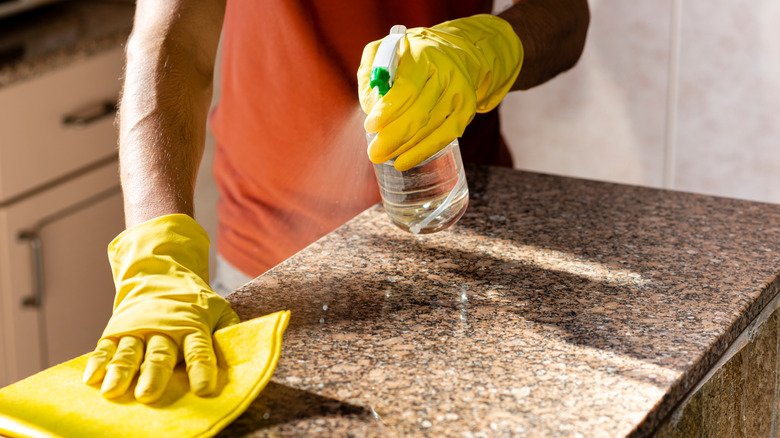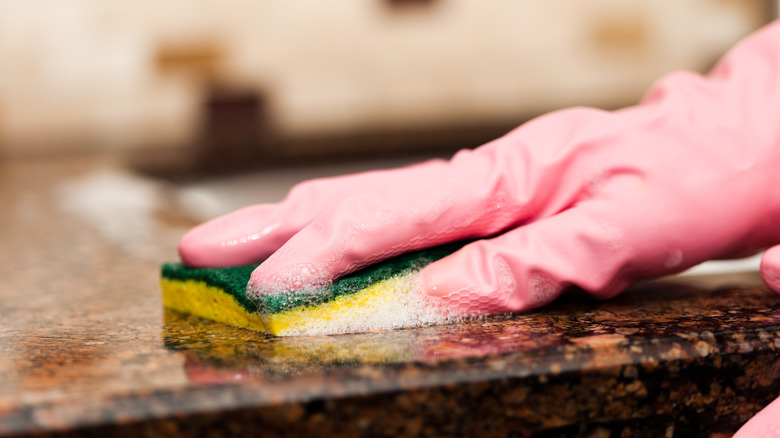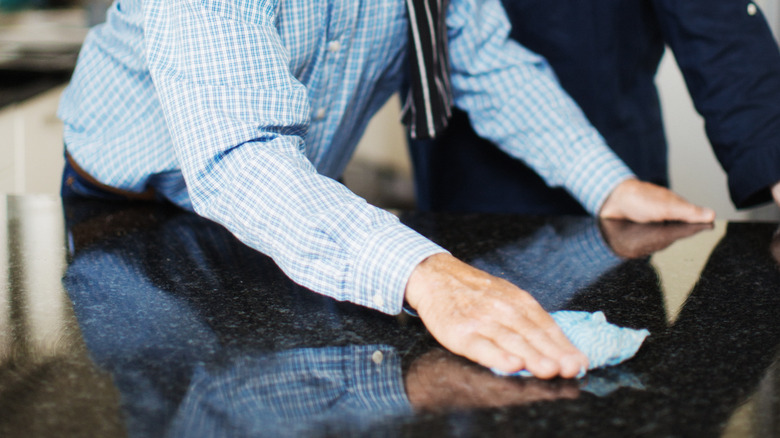The One Product Not To Use On Granite Countertops
The investment in granite countertops comes with some maintenance and upkeep, but these hard, super durable natural stone counters are typically easy to maintain. You will have a very clean surface with a bit of wiping them down with mild soap and water. Using all-natural cleaning methods is an option as well, but you shouldn't use vinegar when cleaning granite. Vinegar seems harmless and a chemical-free option, but it can cause damage to the protective sealant placed on countertops to prevent moisture from penetrating into the stone. That could mean it puts them at risk for damage, especially over time.
You shouldn't use any type of acidic substance to clean the surface of the granite. Vinegar and other acids, like lemon, can cause significant damage to the surfaces with only a few times of use. The acids can cause etching or very tiny scratches in the outer edge of the granite, exposing it to the elements. Granite is certainly durable, but these small areas can weaken the stone while also allowing substances, such as tomato sauce or chemicals, to leach into the stone, discoloring it. Without the protective sealant, the durability of the stone is at risk. Even diluted vinegar shouldn't be used in any granite cleaning process as a result. It doesn't have to be hard, though, to keep your granite countertops in pristine condition.
How to properly clean granite countertops
The simplest way to clean granite is the best option, and that is to use mild dish soap and warm water. Before doing so, use a dry cloth to brush away any loose debris on the stone's surface. Avoid any type of abrasive material, including sponges with a rough portion. If there are any type of stuck-on particles, use a sharp-edged tool, like a razor, at an angle to remove the material. Be careful not to etch into the granite.
Then, make a solution of a few drops of soap into a gallon of warm water. Apply this to the granite surface with a clean, soft cloth. Rinse with a clean wet cloth, and then let it air dry. Most of the time, that's all it takes to create a sanitary, beautiful surface without any streaking. You can also use equal parts of isopropyl alcohol and water in a spray bottle to clean the surface. Just spray it lightly and use a clean cloth to wipe it off about five minutes later. This can help to disinfect the surface a bit more thoroughly as well.
If you want to enhance the shine of your granite countertops, you can take it one step further by using granite oil or granite sealer. It can help to provide a layer of protection to the surface that can wear down over time while also enhancing the coloring and luster of the stone itself.
What to do if you've used vinegar on granite countertops
Perhaps you've already used vinegar on your countertops, and you're unsure how to fix the resulting damage. You may see a small ring or area of discoloration on the surface of the stone. That indicates the protective sealant has damage to it. It's a good idea to work to protect the surface as soon as possible after this occurs. What you need to do is dependent on the amount of damage.
In some situations, the etching is deep, requiring a professional to sand down the edge of the stone, creating a new, level plane. Then, a new sealant is applied to virtually start the process over. A stone restoration professional is best for this.
Contact your granite manufacturer, if possible, to find out what type of sealant was placed on the surface. Some types may allow for the reapplication of the sealant over the existing layer after properly cleaning the surface. Because granite countertops are highly valuable, it's best to let a professional handle the restoration work to the surface, including resealing it if necessary.


